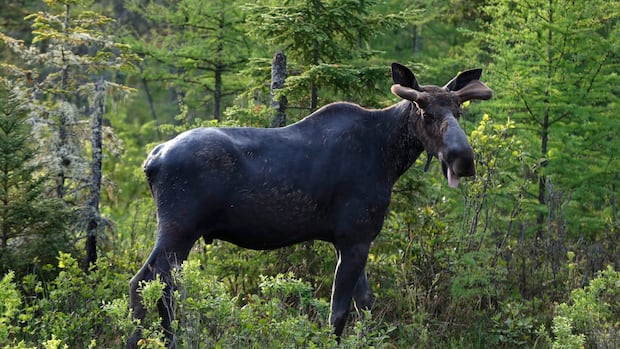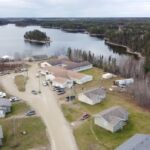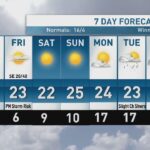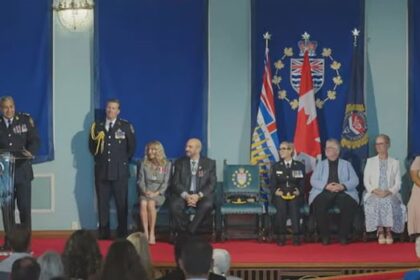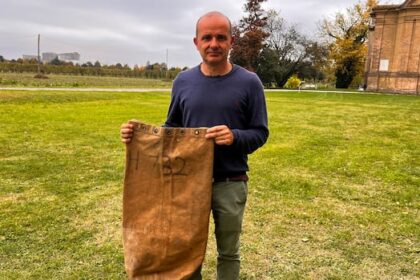ManitobaThe Manitoba Wildlife Federation is asking the province to stop all moose harvesting in a section of western Manitoba this hunting season, due to what they say is a “plummeting” moose population, but that’s not sitting well with First Nations and Métis leaders.Manitoba Wildlife Federation says moose populations may not recover without a total banDave Baxter · CBC News · Posted: Sep 25, 2025 6:00 AM EDT | Last Updated: 2 hours agoThe Manitoba Wildlife Federation is asking the province to stop all moose harvesting in a section of western Manitoba this hunting season, due to what they say is a ‘plummeting’ moose population. (Robert F. Bukaty/The Associated Press)The Manitoba Wildlife Federation is asking the province to stop all moose harvesting in a section of western Manitoba this hunting season, due to what they say is a “plummeting” moose population, but that’s not sitting well with First Nations and Métis leaders. The organization, which represents and advocates for Manitoba hunters and anglers, said in a Sept. 23 release they believe there should be a complete ban on moose harvesting put in place in game hunting areas 18/18A-C, located in the Duck Mountain region, and in areas 13 and 13A in the Porcupine Forest.Because the province already doesn’t allow licensed moose hunting in those areas, the wildlife federation’s request pertains only to the rights of Indigenous harvesters.According to the federation, in 2010, when moose populations in the area dropped to 2,471 animals, the province prohibited moose hunting, by establishing a conservation closure in 2011. In 2022, however, a limited Indigenous harvest was allowed by permit, which allowed some harvesting by First Nations and Métis hunters in the region. Following recent 2023 surveys in the Duck/Porcupine Area, the wildlife federation says estimates are now showing the moose population is well below the threshold that triggered the original closure in 2011, leading to their request this week for a full closure.”The one thing that we can control is not harvesting anything,” MWF senior policy advisor Chris Heald said. Officials with both the Manitoba Métis Federation and the Assembly of Manitoba Chiefs say they disagree with calls for a ban on Indigenous harvesting in the region. Manitoba Métis Federation Minister of Natural Resources Peter Fleming said that currently four Métis harvesters are granted permits every hunting season in the area based on a lottery system, and each harvester can only harvest one moose per season.”One of the things that I think the wildlife federation seems to forget is we have harvesting rights, constitutionally protected harvesting rights,” Fleming said. “[Non-Indigenous hunters] have a privilege to harvest through a provincial tag allotment.”I’d be more than willing to sit down with them and talk with them about the difference between rights and privilege.”Manitoba Métis Federation Minister of Natural Resources Peter Fleming does not agree with the Manitoba Wildlife Federation that there should be a total ban on all moose harvesting in a section of western Manitoba. (Peter Fleming)Fleming said he believes the moose population can survive the limited amount of harvesting currently allowed for Métis hunters, and said only the province and not outside organizations should be deciding the rights of Métis hunters. “It’s not like we’re opening it to everyone, and everyone that has harvester cards can go in and start shooting moose,” he said. “We work with the province very closely on their numbers and we use their numbers for a sustainable number to harvest.”The call for a ban is also being criticized by Assembly of Manitoba Chiefs Grand Chief Kyra Wilson.”While conservation is a shared responsibility, those decisions must be made in full partnership with First Nations, not imposed without consultation,” Wilson said in an email. “Our people have harvested moose since time immemorial, guided by our own laws, values, and conservation practices that prioritize balance and sustainability.”Protecting moose populations is important, but it cannot come at the expense of First Nations sovereignty.”Assembly of Manitoba Chiefs Grand Chief Kyra Wilson is pushing back on calls from the Manitoba Wildlife Federation for a complete ban on moose harvesting in a section of western Manitoba. (Prabhjot Singh Lotey/CBC)Heald said the wildlife federation believes if moose harvesting isn’t banned in the Duck/Porcupine area, the moose population “might never recover.”According to the province’s 2023 big game surveys, which are posted online, total moose population in areas 13 & 13A were estimated to be 409 in 2023, down 59 per cent from 997 moose in 2020. The total moose population in 18/18A-C, was estimated to be 1,169 in 2023, down 46 per cent from 2,171 in 2020. Some First Nations in Manitoba, including the Bloodvein First Nation and the Pimicikamak Cree Nation, have recently been taking steps to try and prevent non-Indigenous hunters from hunting on their traditional territory.Heald says those efforts have nothing to do with the harvesting ban that the wildlife federation is now calling for on Indigenous harvesters in the Ducks and Porcupines area, saying they are “two separate issues completely.””There’s obviously some conflict and some things to work out in those situations, but this is a different thing,” he said. Manitoba Minister of Natural Resources and Indigenous Futures Ian Bushie said in a statement the government is “committed to protecting moose in the Duck and Porcupine Mountain regions by working with hunters, First Nations, communities, and conservation groups on long-term solutions,” but did not say whether it would heed the wildlife federation’s call for an outright ban.ABOUT THE AUTHORDave Baxter is an award-winning reporter and editor currently working for CBC Manitoba. Born and raised in Winnipeg, he has also previously reported for the Winnipeg Sun and the Winnipeg Free Press, as well as several rural Manitoba publications.
Thursday, 5 Mar 2026
Canada – The Illusion
Search
Have an existing account?
Sign In
© 2022 Foxiz News Network. Ruby Design Company. All Rights Reserved.
You May also Like
- More News:
- history
- Standing Bear Network
- John Gonzalez
- ᐊᔭᐦᑊ ayahp — It happened
- Creation
- Beneath the Water
- Olympic gold medal
- Jim Thorpe
- type O blood
- the bringer of life
- Raven
- Wás’agi
- NoiseCat
- 'Sugarcane'
- The rivers still sing
- ᑲᓂᐸᐏᐟ ᒪᐢᑿ
- ᐅᑳᐤ okâw — We remember
- ᐊᓂᓈᐯᐃᐧᐣ aninâpêwin — Truth
- This is what it means to be human.
- Nokoma


